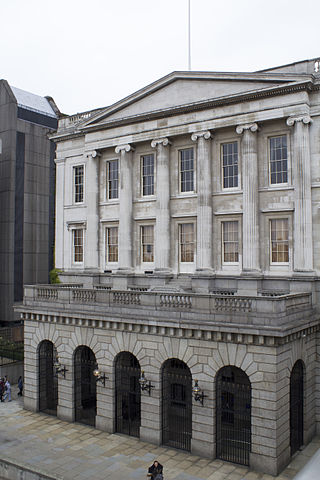
A livery company is a type of guild or professional association that originated in medieval times in London, England. Livery companies comprise London's ancient and modern trade associations and guilds, almost all of which are styled the "Worshipful Company of" their respective craft, trade or profession. There are 111 livery companies in total. They play a significant part in the life of the City of London, not least by providing charitable-giving and networking opportunities. Liverymen retain voting rights for the senior civic offices, such as the Lord Mayor, Sheriffs and Common Council of the City Corporation, London's ancient municipal authority with extensive local government powers.

The Worshipful Company of Fishmongers is one of the 111 livery companies of the City of London, being an incorporated guild of sellers of fish and seafood in the City. The Company ranks fourth in the order of precedence of City Livery Companies, thereby making it one of the Great Twelve City Livery Companies.
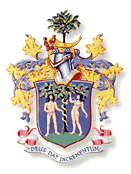
The Worshipful Company of Fruiterers is a livery company of the city of London originally and presently concerned with the fruit trade, and a charitable institution.

The Worshipful Company of Vintners, one of the Great Twelve City Livery Companies, retains close links with the wine trade.
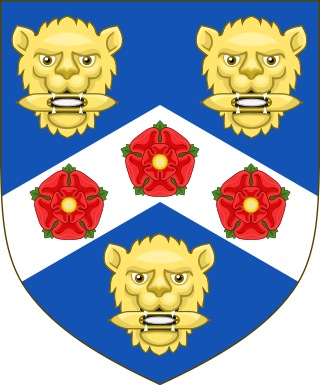
The Worshipful Company of Weavers is the most ancient of the Livery Companies in the City of London. It existed in the year 1130, and was perhaps formed earlier. The company received a Royal Charter in 1155. At present, the Company retains a connection to textiles through its contributions to the textile industry. It has, however, like most other Livery Companies, evolved into a charitable institution rather than remaining a trade association.

The Worshipful Company of Glovers is one of the ancient Livery Companies of the City of London. Glovers separated from the Cordwainers to form their own organisation in 1349 and received a Royal Charter of incorporation in 1639. The company is, as are most other Livery Companies, a charitable organisation, but it still retains close links to its original trade.
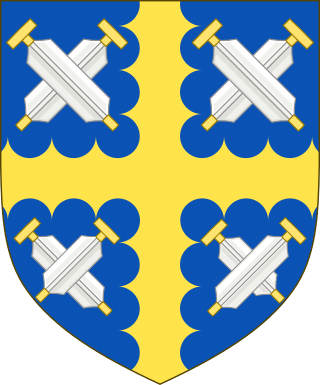
The Worshipful Company of Curriers is one of the ancient livery companies of London, associated with the leather trade.

The Worshipful Company of Upholders is one of the Livery Companies of the City of London. "Upholder" is an archaic word for "upholsterer". In past times, upholders did not just manufacture and sell upholstered goods but were cabinet makers, undertakers, soft furnishers, auctioneers, and valuers. The organisation was formed on 1 March 1360 and officially incorporated by a Royal Charter granted by Charles I in 1626. The Company originally had the right to set standards for upholstery within London and to search, seize and destroy defective upholstery. However, over the years, the Company's power has eroded, as has the profession of upholsterers, because of the advancement of technology.
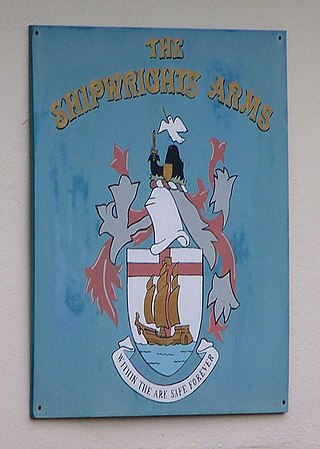
The Worshipful Company of Shipwrights is one of the ancient livery companies of the City of London.

The Worshipful Company of Clockmakers was established under a Royal Charter granted by King Charles I in 1631. It ranks sixty-first among the livery companies of the City of London, and comes under the jurisdiction of the Privy Council. The company established a library and its museum in 1813, which is the oldest specific collection of clocks and watches worldwide. This is administered by the company's affiliated charity, the Clockmakers' Charity, and is presently housed on the second floor of London's Science Museum. The modern aims of the company and its museum are charitable and educational, in particular to promote and preserve clockmaking and watchmaking, which as of 2019 were added to the HCA Red List of Endangered Crafts.

The Worshipful Company of Needlemakers is one of the livery companies of the City of London. The Needlemakers were given letters patent by Oliver Cromwell in 1656, and received a royal charter in 1664. The company gradually lost its role as a trade association, now acting as a supporter of the needle industry instead. Like the majority of livery companies, the Needlemakers' Company is also a charitable institution.
The Worshipful Company of Tobacco Pipe Makers and Tobacco Blenders is one of the Livery Companies of the City of London. The Company ranks 82nd in the order of precedence of the Companies. It does not have its own livery hall but is peripatetic, meeting instead at halls of various other Livery Companies.
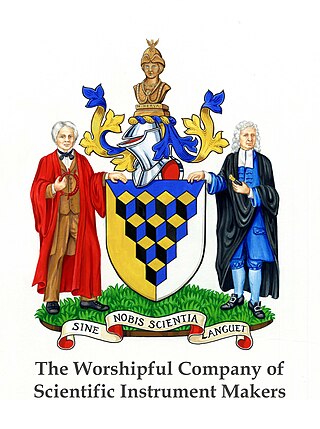
The Worshipful Company of Scientific Instrument Makers is one of the 111 livery companies of the City of London. It ranks 84th in the order of precedence for the livery companies.
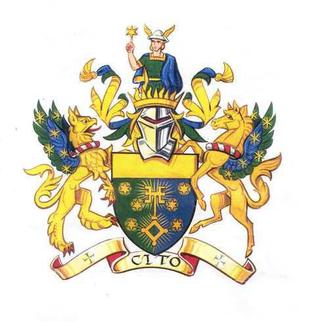
The Worshipful Company of Information Technologists, also known as the Information Technologists' Company, is one of the livery companies of the City of London. The company was granted livery status by the Court of Aldermen on 7 January 1992, becoming the 100th livery company. It received its Royal Charter on 17 June 2010 from Prince Edward.
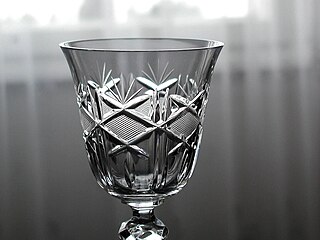
Lead glass, commonly called crystal, is a variety of glass in which lead replaces the calcium content of a typical potash glass. Lead glass contains typically 18–40% lead(II) oxide (PbO), while modern lead crystal, historically also known as flint glass due to the original silica source, contains a minimum of 24% PbO. Lead glass is often desirable for a variety of uses due to its clarity. In marketing terms it is often called crystal glass.
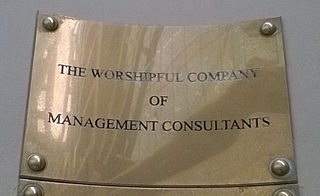
The Worshipful Company of Management Consultants is one of the Livery Companies of the City of London. It draws its memberships from practising management consultants and has close links to the Management Consultancies Association and the Institute of Management Consultancy. The Company's motto is 'Change through Wisdom'.
The Worshipful Company of Constructors is one of the Livery Companies of the City of London. The Company aims to bring together those professionally qualified individuals concerned with aspects of building design, execution, management, vision and economic appraisal.

In the Middle Ages or 16th and 17th centuries, a cloth merchant was one who owned or ran a cloth manufacturing or wholesale import or export business. A cloth merchant might additionally own a number of draper's shops. Cloth was extremely expensive and cloth merchants were often very wealthy. A number of Europe's leading banking dynasties such as Medici and Berenberg built their original fortunes as cloth merchants.

George Ravenscroft was an English businessman in the import/export and glass making trades. He is primarily known for his work in developing clear lead crystal glass in England.

The Worshipful Company of Security Professionals (WCoSP) is the 108th Livery Company of the City of London. It is a non-profit making organisation providing education and health services to members of the security profession.


















